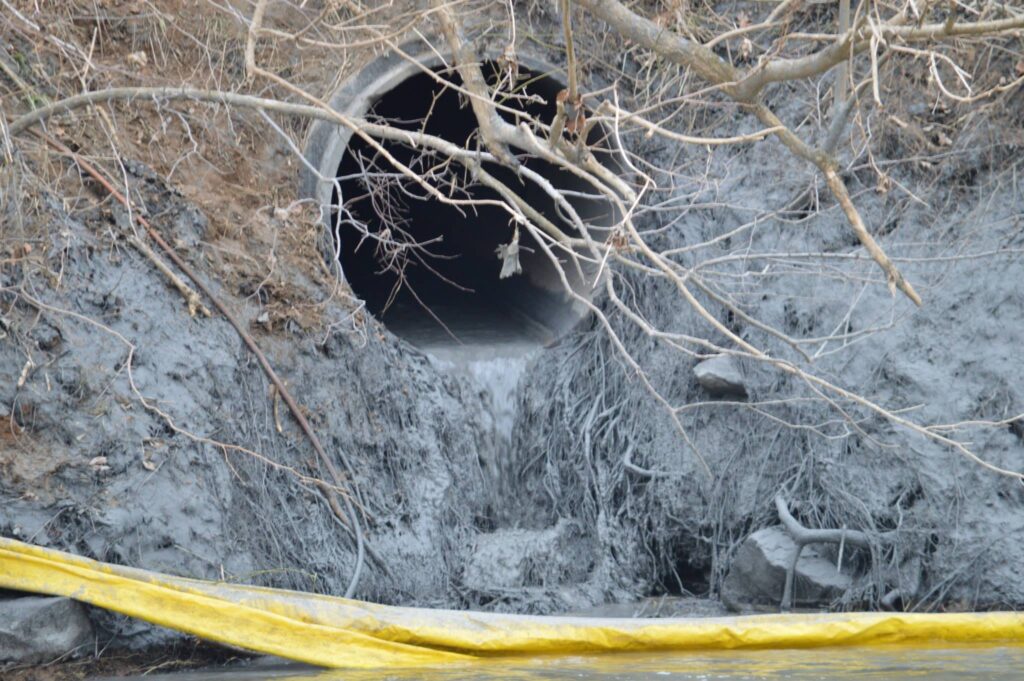Despite ecoterrorism being the No. 1 domestic threat and the lack of security at the pipe entrance, EPA, and Duke Energy acknowledge that no criminal investigation has occurred.
Nine days after the spill, when asked about the possibility of an ecoterrorist, current or former Duke Employee, or any other individual having caused the Coal Ash Spill, EPA lead Coordinator said, “Honestly we haven’t looked at it from that angle. It never even, honestly, never occurred to me til now.”
On February 2, 2014, a storm water drainpipe running under a recently decommissioned coal ash storage pond was breached, resulting in a reported 27 million gallons of coal ash water and up to 82,000 tons of coal ash being dumped into North Carolina and Virginia’s Dan River which threatens many public and private water systems in Virginia and North Carolina. The EPA is leading the emergency response efforts. The leak was capped on February 8. As of February 12, the cause of the breach of the pipe is unknown.
There is a security fence around the coal pond, but the 48-inch storm drain running for nearly 1,000 feet directly under the center of the coal ash pond which empties out into the Dan River was easily accessible to anyone from the river. Prior to the breach, a person could simply paddle or swim to the pipe opening and walk for approximately 800-feet inside the pipe directly under the coal ash pond clear to the breach site. Kevin Eichinger, one of two EPA Federal On-Scene Coordinators leading the emergency management response said, “We ran the camera in from the (river) end. We ran it as far as we could, roughly I wanna say 800 feet. It was a 48-inch line (pipe). Free access, no grids or anything on it.”
According to FBI Special Agent Richard Kolko quoted in a 2008 Foxnews.com article, ecoterrorism “remains what we would probably consider the No. 1 domestic threat.” The FBI reports that more than 600 criminal acts of bioterrorism have occurred in the United States from 1996-2012.
On August 18, 2013, Duke Energy entered into a settlement with the State of North Carolina in relation to charges their coal ash ponds had damaged the environment; 59 days into a 60-day notice of suit given by the Southern Environmental Law Center on behalf of the Catawba Riverkeeper Foundation. George Washington University Law School professor Robert L. Glickman wrote in a 2010 study that, at that time, North Carolina was the only state to ever settle with a utility company within the 60-day notice-of-suit window required for a citizens’ group to sue a utility under the Clean Water Act. The controversial 2013 settlement raised the ire of environmental groups who have actively campaigned against the settlement. The fact that North Carolina Governor Pat McCrory, who once served on the U.S. Homeland Security Advisory Council, spent 28 years as a Duke Energy employee made the $99,111 settlement with Duke Energy all that more questionable. (On February 11, lawyers for the North Carolina Department of Environment and Natural Resources asked a judge to delay implementation of the coal ash settlement.)
Despite ecoterrorism being identied by the FBI as the No.1 domestic threat, the existence of a very recent and public dispute between Duke Energy and environmental organizations, the threat to the domestic water supply, and the unbelievably easy access of the breach site, when questioned for this article about the mere possibility of an ecoterrorist or a disgruntled former Duke Energy employee or even Duke Energy itself having caused the Coal Ash Spill, Eichinger said “It’s something we honestly haven’t had the time to think about because we’ve been concerned about the releases to the river….Honestly we haven’t looked at it from that angle. It never even, honestly, never occurred to me til now.”
According to the Homeland Security website, the Bioterrorism Act of 2002 provides EPA with explicit authority to oversee the preparedness and response to any act of terrorism involving any of the 160,000 public drinking water systems in the United States. The coal ash spill is threatening the drinking water of several communities downstream including Danville, Virginia. In addition, Eichinger states that EPA is the controlling authority and has final decision making power over Duke Energy in the ongoing emergency response to the coal ash spill.
Ecoterrorism (or bioterrorism, considering that drinking water is in danger) is not the only possible explanation for the breach which has not been investigated or considered in the 10 days since the incident. Neither Duke Energy nor the EPA have investigated the possibility of a rogue Duke Energy employee, disgruntled former employee, or even simply a vandal, having sabotaged the pipe. Plans are currently in place to fill the remaining section of the pipe with cement which will effectively make any future investigation impossible. The main point of this article is to report that the EPA, Duke Energy, and no other law enforcement agency at all, have done any investigation whatsoever into the actual cause of the pipe breach. The EPA has not considered the full range of possibilities including self-sabotage, negligence, or human error on the part of Duke Energy. Every possible scenario is on the table because no law enforcement authority has looked into the possibility of a crime. The Department of Homeland Security is tasked with protecting the nations critical infrastructure which includes power plants and water supplies. Despite both being at risk, no effort has been made to rule out foul play.
On February 11th, Jeff Brooks, Media Spokesperson for Duke Energy said of any law enforcement officers from any organization including FBI and Homeland Security, “I’ve not seen any of those individuals onsite.”
Photo Courtesty of Catawba Riverkeeper Sam Perkins
